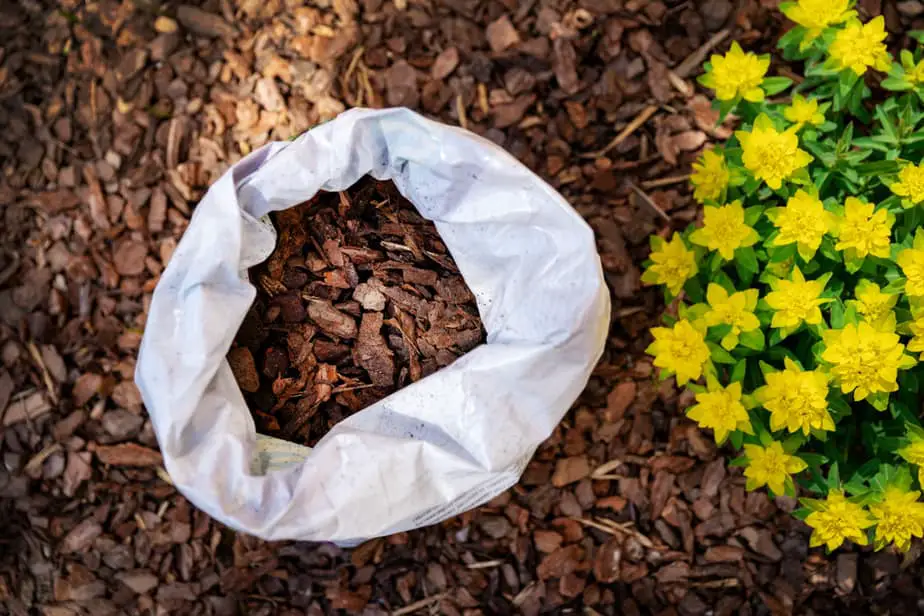Mulch is commonly used in gardens to reduce soil moisture loss, discourage weeds, prevent soil erosion, enrich the soil, and keep the garden tidier. Mulch comes in various types, including straw, ground rubber, bark, hay, ground recycled pallets, newspaper, and composted leaves. Mulch has many benefits, but is mulch flammable?

Table of Contents
When Is Mulch Flammable?
If mulch is laid too high – more than a few inches – it can become too hot and can catch fire. The risk increases when there has not been much rainfall or when it is very warm; or when there are high winds. Hot, and extended periods of dry weather dramatically increase the risk of mulch fires because mulch dries out quickly. Therefore mulch fires are more likely in the late spring or summer months.
Mulch can also ignite if cigarettes are left in or around it.
If mulch is laid too close to your home or touches it, your house could be at risk if the mulch catches fire.
Once mulch catches fire, it is challenging to put out.
What Type of Mulches Are More Fire-Prone?
2003 research indicated that rubber mulch catches fire quickly. Shredded mulch catches fire quicker than chunky mulch. The most fire-resistant mulches include brick chips, cocoa shells, sod, large pine bark nuggets, and shredded hardwood.
A 2007 study showed that pine needles ignite very quickly, and both pine needles and large pine bark nuggets burned very fast.
Some organic mulches, such as shredded pine bark, ignite only after the mulch has weathered on the ground for six months or more.
How Can I Prevent Mulch Fires?
There are many ways that you can prevent mulch fires, including the suggestions below:
- Be alert to the fire risk, particularly during hot and dry weather.
- Ensure there is at least 18 inches between mulched garden beds and both combustible materials and electrical devices like decorative lighting. Pesticides, gas cans, and fertilizers can accelerate a mulch fire.
- Since many mulch fires are caused by people unintentionally, do not throw cigarette butts or matches on the ground – put them in proper receptacles away from mulch. A massive mulch fire occurred in Massachusetts in 2015 due to smoking materials discarded in a mulched bed. This fire led to a loss of life, destruction of property, and a dollar loss valued at $6.7 million.
- Water mulched garden beds regularly if possible, especially in hot weather. Most mulch is dark, so it absorbs more heat and gets hot quickly. Moist mulch has lower – and therefore safer – inner temperatures.
- Keep mulch between two and four inches deep to reduce the risk of spontaneous combustion. Large heaps of mulch can produce steam when mixed with cool air. Thinner-spread mulch is less likely to have heat trapped within it, reducing the fire risk. If your area is prone to wildfires, gravel mulch may be a better option than wood mulch. Put in fire-resistant plants to reduce the fire risk.
- Use non-combustible mulch like rock or pea gravel around your gas meter and next to combustible parts of a building or structure.
- Consider adding a 10-20 inch strip of decorative river rock around your house. This acts as a firewall between your home and your mulch. This river rock can also protect your house from mold and rot that can build up from decomposing mulch.
- If you see anything smoking in a mulched bed, put it out if you can. Let someone know inside the property, if you are not the owner, or call 911.
- Keep fire pits, outdoor candles, and fireworks away from mulched garden beds.
- If you live in a hot, dry climate, stone mulch is less of a fire risk.
Final Thoughts
While mulch is beneficial to your gardens and pleasant to the eye, they can pose a fire risk if not properly applied to your gardens or if precautionary measures aren’t in place. Remember that gravel and rock mulches are the safest mulch to use at home, though you can prevent other mulches from catching fire by laying them thickly on the ground and outlining them in rock.
